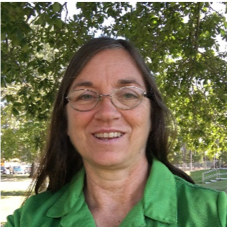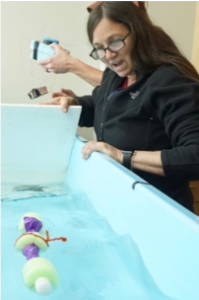NC Energy Literacy Fellow receives fellowship award to study grid resilience at home and abroad
June 16, 2020
and member of the program’s
Teacher Advisory Committee
Denise Renfro, a CTE teacher and Director of the Academy of Green Technology at Douglas Byrd High School in Fayetteville, NC, and participant in the UNC Institute for the Environment’s 2019 NC Energy Literacy Fellows Program, received a Fund For Teachers Fellowship grant and will be going to Canada and Iceland to study energy generation and electric grid resiliency in the summer of 2021. Renfro cites her participation in IE’s NC Energy Literacy Fellows Program and the 2011 NC CLIMATE Fellows Program as providing her the necessary background knowledge to pull together an innovative proposal that will enable her to explore the impact of climate on the electric grid and bring what she learns back to the classroom.
“My school is a Title 1 urban school that is arguably the poorest, most underserved school community in our district. My career goal, and my goal for this fellowship, is to help my students overcome the confidence gap by providing them desperately needed engagement in authentic, real-world learning experiences that will instill confidence to engage with STEM content and consider future STEM careers,” says Renfro.
Learning about the electric grid during the 2019 NC Energy Literacy Fellows Program, Renfro admits she “was surprised at how poor my understanding of the electric grid was and what the impact of that knowledge gap meant—for me and for my students.”
“I can no longer justify teaching the four main components of the grid and then moving on to renewable energy. A much deeper investigation is required. My student’s futures are connected to the grid in ways they cannot currently imagine, and it is imperative they understand the unique relationship between the grid, climate forces, renewable energy, and future resilience. It is imperative, in part, because they are the ones who stand to suffer the most from the consequences of a vulnerable grid.”

Her fellowship experience will take her to Canada to meet with representatives of the Offshore Energy Research Association and Fundy Ocean Research Centre for Energy to learn about tidal and wave energy research and integration into the grid. Next, she’ll head to Iceland to witness how the country’s nearly 100% renewable energy generation has been the driver of their rags-to-riches economic recovery. She’ll visit the Hellisheidi Geothermal Plant and the Gulfoss Geothermal area and tour several hydroelectric plants. “These opportunities will create new insights into energy generation and set the stage for discussions on distributed energy and modernizing the grid. I expect what I learn will lead directly to hands-on projects for my students,” says Renfro.
Back home, she has arranged for an internship with her local utility where she will shadow utility workers to learn about transmission and distribution lines and equipment, past and present areas of grid vulnerability and innovative grid resiliency efforts such as the Fayetteville Public Works Commission’s new Community Solar + Storage Project. These experiences will enable her to identify relevant curriculum connections and ultimately prepare her students for technical careers in the energy sector. Renfro, an advocate of using drones to engage students, plans to provide her students with the opportunity to consider real-world applications for using drones in the energy sector by enabling them to use a drone to view a local solar farm and its transmission infrastructure.
“My hometown suffered greatly from the impact of Hurricane Matthew and Florence and many of my students were without electricity for days if not weeks. This connection to the local utility will allow me to provide authentic learning opportunities for my students as the topics of climate and grid resiliency can capture their attention and address broad student limitations like access to and confidence with technology, awareness of grid resiliency issues in their neighborhoods, as well as a pathway to economically stable future careers.”
“I have been fortunate to receive high-quality professional development on the electric grid through IE’s NC Energy Literacy Fellows Program. And that experience, combined with the experiences and knowledge gained from this fellowship is transforming how I teach about energy,” says Renfro.
“What is exciting to me about conducting long-duration teacher professional development experiences is to be able to witness the ripple effect that results when a teacher like Denise makes new and deeper connections to their curriculum, their community and their students’ lives,” says Dana Haine, Program Director for the NC Energy Literacy Fellows Program and K-12 Science Education Manager for IE’s Center for Public Engagement with Science. “There are always going to be impacts that won’t show up on a workshop evaluation form and instead reveal themselves over time as teachers integrate what they learn into their profession.”
The NC Energy Literacy Fellows Program is sponsored by UNC-Chapel Hill’s Institute for the Environment with funding provided by the Duke Energy Foundation.
Story by Dana Haine, K-12 Science Education Manager, Center for Public Engagement with Science, UNC Institute for the Environment
